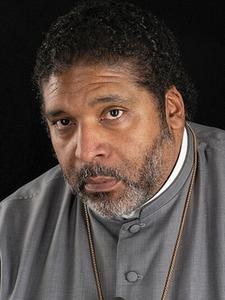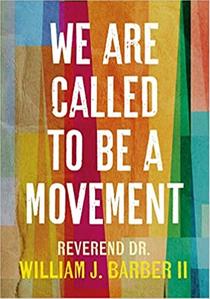
|
|
| photo: Don Usner | |
The Reverend Dr. William J. Barber II is the author of We Are Called to Be a Movement (Workman, June 9, 2020), a powerful and poetic sermon demanding an end to poverty in the wealthiest nation in the world. Picking up the unfinished work of the Rev. Dr. Martin Luther King Jr., Barber serves as president of Repairers of the Breach and co-chair of the Poor People's Campaign: A National Call for Moral Revival, uniting poor communities across the country to affect policies and elections at every level of government, and build lasting power for the 140 million poor and low-income people in the United States. On June 20, 2020, The campaign's virtual Poor People’s National Assembly and Moral March, with more than 100 organizations, Al Gore, Jane Fonda, Wanda Sykes and others, will focus on the lack of police accountability, voter suppression, poverty and the voices of the poor.
On your nightstand now:
I'm on the road for nine months, crisscrossing the nation to connect with poor and low-wealth people who are building the Poor People's Campaign together. I keep my Bible on the bed stand, and I keep reading the prophets--especially Ezekiel, Isaiah, Jeremiah, Micah and Jesus--alongside a couple of reports on the crisis of poverty: Healing Our Divided Society, edited by Fred Harris and Alan Curtis, and The Souls of Poor Folks, edited by Saurav Sarkar and Shailly Gupta-Barnes.
Favorite book when you were a child:
My father used to ask me to read from Clarence Jordan's Cotton Patch Gospels in church before he preached. I loved the way Jordan, a Greek scholar, translated the Bible's ancient stories into a context and a language that was familiar to me. I also loved James Weldon Johnson's God's Trombones, which trained my ear to believe that words make worlds.
 Your top five authors:
Your top five authors:
Wow, that's hard. On economics, I always read Joseph Stiglitz, who won the Nobel Prize in Economics. His The Cost of Inequality is essential reading. On history, I've got several favorites: John Hope Franklin's From Slavery to Freedom, Kevin Kruse's One Nation Under God, Nancy MacLean's Democracy in Chains and Ibram Kendi's Stamped from the Beginning. In theological and biblical studies, I come back again and again to Howard Thurman, Ched Myers and Renita Weems. But there are so many good ones.
Book you're an evangelist for:
Liz Theoharis, my co-chair of the Poor People's Campaign, has a brilliant book called Always with Us? And Jonathan Wilson-Hartgrove, who is a scribe for our movement, has a book called Revolution of Values that lifts up the moral narrative we think is needed to revive the heart of democracy. A couple of other new books I'm encouraging people to read: Jeff Madrick's Invisible Americans, on child poverty in America, and Katherine Stewart's The Power Worshippers, which exposes the danger of religious nationalism in America today.
Book you never part with:
My father wrote a book on the history of our denomination in North Carolina, and I treasure its wisdom about the nature of moral fusion movements and their capacity to change this nation. I also always keep close to me a copy of Dr. King's Where Do We Go from Here; Roland Rolheiser's Sacred Fire; and Common Prayer: A Liturgy for Ordinary Radicals that offers a prayer for morning, midday and evening each day.
Book that changed your life:
Howard Thurman's Jesus and the Disinherited. I hold in great esteem everything Thurman wrote, but that single book crystalizes the message of Jesus in a way that has defined my life and ministry.
Favorite line from a book:
William Turner, who was my preaching professor in seminary, wrote, "However you describe your spiritual experience--saved, born again, filled with the Spirit--if it does not produce a quarrel with the world then your claim to spirituality is terribly suspect."

